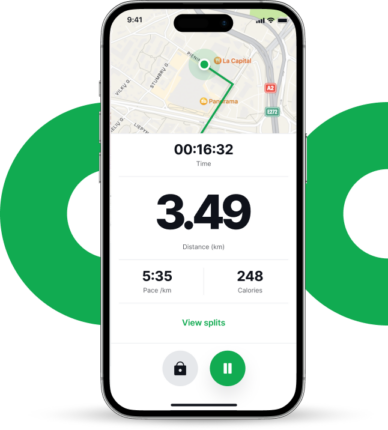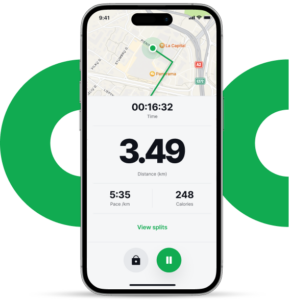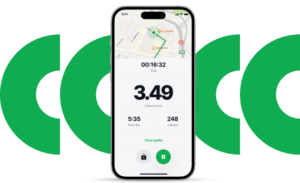Ready to move beyond 5k and 10k races? A 15k race can be a good bridge to more demanding distances like a half-marathon or full marathon. All this while being a challenge in itself.
In this post, we’ll go beyond answering how many miles is a 15k race. We’ll talk about the average time for this race and how to know whether you’re ready for it.
Let’s start with defining the 15k in miles.
In This Article:
How Far Is a 15K Race?
So how many miles in 15k? A 15k is 15 kilometers, and since a kilometer is approximately 0.62 miles, a 15k is about 9.3 miles.
If you were to run a 15k race on a standard outdoor track, you’d have to go around it about 37.5 times.
A 15k packs a heavy punch, but it’s not as exhausting as a marathon. You can prepare for it even if you don’t have that much running experience.
To get a better understanding of the demands of this race, let’s look at some of the other race distances and time requirements.
How many miles is a 5k?
A 5k race is “only” 3.1 miles. It’s a comfortable distance for new runners, who can aim for a good finish if they follow an effective training plan.
If you’re wondering, “What is a good 5k time?” your age, gender, and fitness level all play a part. A decent finish for new runners is anywhere between 30 and 40 minutes.
For a good time, aim for under 30 minutes, or even under 25 minutes. That is possible if you’re fit and train well. That’s reasonable considering that the world record for the 5,000 meters race is 12:35.36 for men and 14:06.62 for women.
How far is a 10K?
At around 6.2 miles, a 10k race is double the distance of a 5k. And that means double the challenge, too.
What is a good 10k time? A finish between 50 and 60 minutes is a good time for most runners. More advanced runners can aim for a finish in under 50 minutes.
Some runners ask, “Is running 10k in 60 minutes good?” The answer is yes if you run about 25–30 miles a week. If it’s your first race especially, you don’t want to push yourself too hard.
What’s a 12K race?
While not as popular as a 10k event, a 12k race can be an intermediate event between a 10k and a 15k race.
A 12k is 12 kilometers long, or around 7.4 miles long. Experienced runners can finish it in as little as 30 to 40 minutes. But if you’re new to it, don’t push yourself too hard. Don’t go straight from the couch to running a 12k.
How far is a half-marathon?
One of the most popular running events, the half-marathon, is 21 kilometers or about 13.1 miles.
Runners often ask, is a half-marathon in under two hours a good time? The answer is yes. You’ll be running at an average mile pace of 9.09 minutes – no mean feat.
How many miles is a 20K race?
The 20k race is slightly shorter than a half-marathon at 12.4 miles. It’s not as popular as the latter. But it can be a good progression from a 15k race.
How far is a 25K in miles?
More demanding than a half-marathon, a 25k race is approximately 15.53 miles long.
It’s a good distance to run after you’ve completed a half-marathon and if you’re aiming to run a full marathon soon. It can give you that extra bit of experience that will help you complete a full marathon.
A good time for a 25k really depends on who you’re asking. Completing the race under 3 hours is good if it’s your first event of this kind. More experienced runners will aim for a better finish.
How far is a marathon?
The king of all running races, the marathon, is 42.195 kilometers or 26.2 miles long. The name of marathon comes from the legend of Pheidippides, a Greek messenger who ran from Marathon to Athens to bring news of the victory of the Greeks over the Persians. Before collapsing, exhausted, and breathing his last.
So, what is the average marathon finish time? A lot of factors come into play, including age, gender, running experience, and fitness level. According to The State of Running report, the average finish time for a marathon since 2001 is 4:32:49.
How far is an ultramarathon?
The ultimate running events, ultramarathons, are any race longer than 26.2 miles. An ultramarathon can be anything from 50 kilometers (about 31 miles) to over 3,100 kilometers (over 1,926 miles)!
What Is the Average Time for a 15K Race?
According to most sources, the average time for a 15k race is about 1:43. That means an 11-minute pace.
What is the ideal running pace for you? It depends on your fitness level and running experience. You don’t have to aim for an 11-minute pace if you’re running your first 15k.
Go for a pace that feels comfortable. Completing a 15k as a beginner is good enough for starters.
How should you train for a 15K?
Training for a 15k takes about 8 to 12 weeks, depending on your experience and fitness level.
A good approach is to start with low mileage and gradually add to it over time. Run up to four short to mid-distance runs every week. Aim for at least 8 miles per run or according to your plan.
But don’t do only runs. Strengthening your core will help you become more prepared for a 15k.
Get the most out of your workouts by following a personalized training plan for a 15k. Your plan should take into account your fitness level, running experience, gender, and other factors.
Cross training for runners
Cross training can also help. By reducing the stress on your body as you run, it minimizes the risk of injury while boosting your cardiovascular endurance.
Cross-training activities you can add to your 15k training plan include strength training, aqua jogging, swimming, cycling, elliptical training, and brisk walking.
Seek to build at least one cross-training activity into your weekly session. But don’t push yourself too hard. Remember to add rest days to your plan.
Why Is Recovery Important for Runners?
If you’re keen on finishing a 15k with a good time, you may be asking yourself, “What happens if I run every day?” or “Is running 10km a day good?”
Running every day puts a lot of stress on your bones and joints and increases your risk of overuse injury. You may get muscle tears, shin splints, or stress fractures. These can sideline you for weeks or longer.
So, running 10km a day isn’t the best way to get ready for a 15k. Or any other race, for that matter. It will harm you more than help you.
Recovery is important for runners because it gives your muscles and the rest of your tissues time to recover from the stress of running. Rest helps make you a stronger runner. So don’t skip it.
How Do You Know You Are Ready for a 15K?
We’ve seen how long a 15k is – about 9.3 miles. Transforming 15k to miles may make the distance seem shorter. But the race won’t be any easier.
You’ll be ready for a 15k once you’ve completed your training plan – that’s up to 12 weeks of training. And you can keep up a pace that lets you finish the race within 40–50 minutes, or under an hour if you’re a senior runner.
You should also have no injuries and feel mentally prepared to tackle the strain of the event. If you build longer running sessions in your training plan, 8 to 11 kilometers, that should help.
Takeaways
In the end, here are a few key things to remember:
- Running a 15k or 9.3 miles is demanding, so don’t go straight from the couch to race day – you won’t manage it.
- Running a 5k and 10k before a 15k will make it easier and can help you build strength and endurance more gradually.
- Follow a personalized training plan that includes strength training, cross-training, and enough rest days.
- Aim to train for at least 8 weeks for a 15k and 10–12 weeks or more if you’re new to running.
Preparing and running a 15k can be a memorable experience, one of the highlights of your life as a runner. Make the most of it!
Frequently Asked Questions
How many miles is a 15K run?
A 15K run is approximately 9.32 miles long.
What does 15K mean in miles?
The “K” in “15K” stands for kilometers. There are 0.621 miles in 1 kilometer, so 15K is equal to 15 x 0.621 = 9.32 miles.
What is 10K in miles?
A 10K run is approximately 6.21 miles long.
What is the meaning of 5K marathon?
A 5K marathon is a 5-kilometer (3.1-mile) long race. The term “marathon” is traditionally used for races longer than 26.2 miles, but it is sometimes used for shorter races as well.
References:
- Kleiner, D.M. and Glickman, S.E., 1994. Medical considerations and planning for short distance road races. Journal of Athletic Training, 29(2), p.145.
- Pfitzinger, P. and Douglas, S., 2019. Advanced marathoning. Human Kinetics.
- Oliveira, G., Comba, J., Torchelsen, R., Padilha, M. and Silva, C., 2013, August. Visualizing running races through the multivariate time-series of multiple runners. In 2013 XXVI Conference on Graphics, Patterns and Images (pp. 99-106). IEEE.
- Murphy, S., 2022. Run Your Best Marathon: Your trusted guide to training and racing better. Bloomsbury Publishing.
- Culpepper, A., 2015. Run Like a Champion: An Olympian’s Approach for Every Runner. VeloPress.














